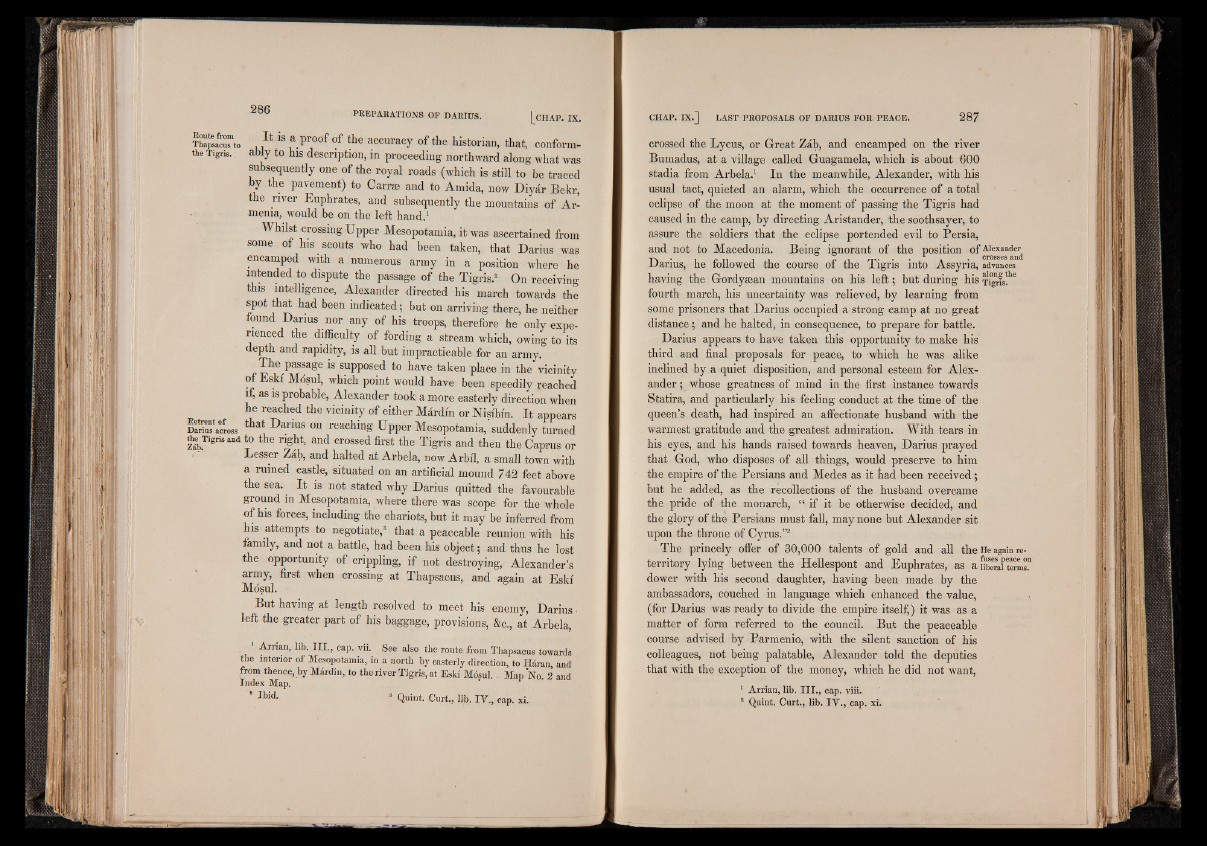
?Cacu” o . * is f.P roof of the accuracy of the historiau, that, conform-
the Tigris, ably to his description, in proceeding northward along what was
subsequently one of the royal roads (which is still to be traced
by the pavement) to Carra and to Amida, now Diyár Bekr,
the river Euphrates, and subsequently the mountains of Armenia,
would be on the left hand.1
Whilst crossing Upper Mesopotamia, it was ascertained from
some of his scouts who had been taken, that Darius was
encamped with a numerous army in a position where he
intended to dispute the passage of the Tigris.2 On receiving
this intelligence, Alexander directed his march towards the
spot that had been indicated; but on arriving there, he neither
found Darius nor any of his troops, therefore he only experienced
the difficulty of fording a stream which, owing to its
depth and rapidity, is all but impracticable for an army.
The passage is supposed to have taken place in the vicinity
of Eski Mosul, which point would have been speedily reached
if, as is probable, Alexander took a more easterly direction when
he reached the vicinity of either Márdín or Nisi bin. It appears
Darius^aeross ®arius on reaching Upper Mesopotamia, suddenly turned
tí^T ig rk a n d to the right, and crossed first the Tigris and then the Caprus or
Lesser Záb, and halted at Arbela, now Arbil, a small town with
a ruined castle, situated on an artificial mound 742 feet above
the sea. I t is not stated why Darius quitted the favourable
ground in Mesopotamia, where there was scope for the whole
of his forces, including the chariots, but it may be inferred from
his attempts to negotiate,3 that a peaceable reunion with his
family, and not a battle, had been his object; and thus he lost
the opportunity of crippling, if not destroying, Alexander’s
army, first when crossing at Thapsacus, and again at Eski
Mosul.
But having at length resolved to meet his enemy, Darius •
left the greater part of his baggage, provisions, &c., at Arbela,
1 Arrian, lib. I I I . , cap. vii. See also the route from Thapsacus towards
the interior of Mesopotamia, in a north by easterly direction, to Háran, and
from thence, by Márdín, to the riv e r Tigris, at Eski Mósul. Map No. 2 and
Index Map.
2 Ibid' 8 Quint. Curt., lib, IV ., cap. xi.
crossed the Lycus, or Great Zab, and encamped on the river
Bumadus, at a village called Guagamela, which is about 600
stadia from Arbela.1 In the meanwhile, Alexander, with his
usual tact, quieted an alarm, which the occurrence of a total
eclipse of the moon at the moment of passing the Tigris had
caused in the camp, by directing Aristander, the soothsayer, to
assure the soldiers that the eclipse portended evil to Persia,
and not to Macedonia. Being ignorant of the position of Alexander^
Darius, he followed the course of the Tigris into Assyria, advances
having the Gordyaean mountains on his left; but during his Tigris!*16
fourth march, his uncertainty was relieved, by learning from
some prisoners that Darius occupied a strong camp at no great
distance; and he halted, in consequence, to prepare for battle.
Darius appears to have taken this opportunity to make his
third and final proposals for peace, to which he was alike
inclined by a quiet disposition, and personal esteem for Alexander
; whose greatness of mind in the first instance towards
Statira, and particularly his feeling conduct at the time of the
queen’s death, had inspired an affectionate husband with the
warmest gratitude and the greatest admiration. With tears in
his eyes, and his hands raised towards heaven, Darius prayed
that God, who disposes of all things, would preserve to him
the empire of the Persians and Medes as it tad been received;
but he added, as the recollections of the husband overcame
the pride of the monarch, “ if it be otherwise decided, and
the glory of the Persians must fall, may none but Alexander sit
upon the throne of Cyrus.”2
The princely offer of 30,000 talents of gold and all the He again reterritory
lying between the Hellespont and Euphrates, as a fn!erai terns!
dower with his second daughter, having been made by the
ambassadors, couched in language which enhanced the value,
(for Darius was ready to divide the empire itself;) it was as a
matter of form referred to the council. But the peaceable
course advised by Parmenio, with the silent sanction of his
colleagues, not being palatable, Alexander told the deputies
that with the exception of the money, which he did not want,
‘ Arrian, lib. I I I ., cap. viii.
1 Quint. Curt., lib. IV ., cap. xi.